
December 27, 2009
 CR Holiday Interview #7—David Welsh On MW
CR Holiday Interview #7—David Welsh On MW

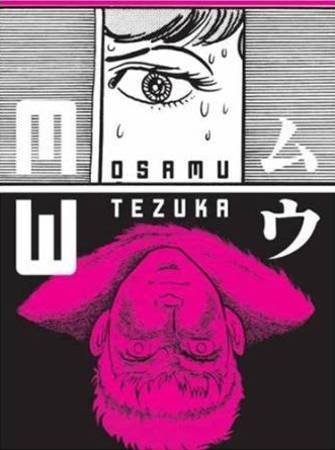
I've never met
David Welsh, but it's been my privilege to publish his column "
Flipped!" and before that to depend on his reporting concerning a Big Comics News Story in which I was hopelessly intertwined. Like many great reviewers, the West Virginian is at heart an enthusiastic reader. He seems comfortable speaking from a grounded position within a hard-won point of view no matter where that carries him. One of the many great books he chose for possible discussion is
Osamu Tezuka's
MW, which I thought a really out there, really fun book with a lot of tendrils in various comics movements of the last ten years. -- Tom Spurgeon
*****
TOM SPURGEON: One thing I find interesting in your CWN
review of this material is that you extol the virtues of discussion as a critical process. I think of you as someone who claims a benefit from the interaction you have with other manga-focused writers. Is that a fair assessment? How has discussing works led you to greater critical insight than you might have on your own?
DAVID P. WELSH: I think it's a fair assessment, yes. The opportunity to talk with people about comics is the main reason I write about them, to be honest. I'm assuming that a lot of people in their 40s who read comics have experienced their comics-reading peers outgrowing the hobby at some point, so you're left without that sounding board. For me, part of the beauty of blogs and other venues where people write about comics is the back-and-forth. My initial learning curve with manga was facilitated entirely by bloggers who enjoyed it who shared my taste in other areas. If I'd just walked into a bookstore and picked something at random, it would have been hopeless.
Beyond that basic "what should I read" level, it's valuable to me to see different people approach the same work from different directions. I don't feel like I have the best visual vocabulary, so when I see someone really engage with the art, the style of illustration, I take something away from that. I feel like I've read a fair amount of reference about manga, but there are always people who've read different sources, so that can expand my understanding of the context of a work, especially with a historic figure like Osamu Tezuka. And I think there's a lot of diversity among people who right about manga in terms of age, ethnicity, gender, sexual orientation, and so on. And while none of that defines them as a critic, it can inform them in interesting ways, and it all comes together in interesting ways.
 SPURGEON: Is it hard on any level to process a work as out there as
SPURGEON: Is it hard on any level to process a work as out there as MW
above and beyond that on a surface reading it's completely freaking nuts? To borrow some of your own language, there's something so demented about a Walt Disney-level figure doing melodrama this bizarre I think at times it becomes hard to me to focus on its actual virtues and detriments. Do you think the book generates a certain amount of good will just because of who is doing it and do you see that as a problem?
WELSH: I hope the fact that it's Tezuka generates a certain amount of good will. I know there are people who will pick up and read anything he's created, whether it's
Astro Boy or
MW, and I'll readily admit that a part of the appeal of a book like
MW is the knowledge that it's by the guy who also did
Dororo and
Princess Knight.
I do think that kind of knowledge of the breadth of his body of work does help some books more than others.
Swallowing the Earth is one of those comics that are more historically important than it is good, I think. But in spite of the novelty of the depravity contained in
MW, I do think it's a very good comic in terms of storytelling and structure. With
Swallowing the Earth, it's interesting to place it on the Tezuka timeline, and you can admire the ambition and see the seeds of better later work.
MW is empirically good, and the bizarre melodrama is gravy.
SPURGEON: You also said in that review that you feel that Tezuka his themes differently in works like this one as opposed to his work for kids. Can you give an example of a theme in MW
that gets developed more fully because of this opportunity to talk directly to adults?
WELSH: One that comes immediately to mind is the power of greed or desire for power, which comes up a lot in Tezuka's work. The dilemma of Hyakkimaru, the protagonist in
Dororo, springs from that kind of hunger for wealth and influence. But the perpetrator's perspective, and all of the greedy people Hyakkimaru and Dororo encounter, is narrowly presented. They want things, they acquire them through unsavory means like force or deception, and that's pretty much all they bring. The nuance of the story belongs to the heroic characters. It's their journey, and the bad guys are fairly one dimensional.
While
MW has the same structure -- greedy men leave a boy profoundly damaged, and he seeks justice -- there are more layers to the people who created the problem in
MW. They aren't innately horrible people so much as average men who made bad decisions out of self-interest. They deserve punishment for that initial act, but they aren't entirely defined by vice or cruelty. They're more rounded, and I think that's a presentation that adults would embrace. It's a more complex argument that normal people can make terrible choices in a moment of pressure or opportunity and that there can be devastating consequences that they couldn't foresee.
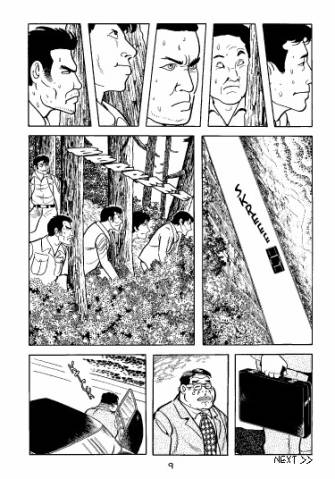 SPURGEON: One thing I'm not sure is appreciated in
SPURGEON: One thing I'm not sure is appreciated in MW
as opposed to a couple of the other Tezuka pieces is its ambitious construction. We're kind of dropped right into the action, meet our principals, see them engage one another but also learn more about the nature of their relationship and the wider events in flashback as we move through things. It's really slick, almost to the point you don't notice its complexity. Am I right in that this is sort of atypical of Tezuka? Do you think he chose the structure he did just to emphasize the thriller aspects, or is there something more to it?
WELSH: It does strike me as atypical, but it is hard to compare something like
MW to series like
Astro Boy or
Black Jack, which are episodic, character driven properties. It's kind of like comparing
A Contract with God to
The Spirit, you know?
MW was conceived with a beginning, middle and end. It's slick, but it's also tight. There's no waste in its construction, but there's that frugal artistry that's kind of unique to thrillers. I've seen it said that Tezuka wanted to trump the emerging
gekiga artists of the time, to do what a lot of them did -- gritty drama for grown-ups -- better, so the level of craft in
MW might just reflect Tezuka achieving that goal: "I can be a great
gekiga artist, too." And it's interesting to watch his progression in terms of the available work of that kind, starting with
Swallowing the Earth from the late 1960s, which is fascinating but a mess, moving on to
Ode to Kirihito from the early 1970s, which marks a significant improvement in his telling of a high-minded thriller, to
MW in the mid-1970s, which is pretty much flawless at least in terms of construction and pacing.
Tezuka's journey with
gekiga could be your basic shônen story -- a novice chooses a goal and decides to become the best in all of Japan. I don't think there's enough
gekiga available in English to determine whether he achieved that goal, but he did make some great comics in that category.
 SPURGEON: Yuki is one of the more despicable characters to ever drive the action in a lengthy comic serial. How is it that through Tezuka's treatment we don't hate him to the point where it's just intolerable to follow his story?
SPURGEON: Yuki is one of the more despicable characters to ever drive the action in a lengthy comic serial. How is it that through Tezuka's treatment we don't hate him to the point where it's just intolerable to follow his story?
WELSH: Part of it is the fascination in seeing what he'll do next. There's very little repetition in his wrongdoing, and Tezuka is remarkably creative in coming up with a string of new outrages for Yuki to commit. He's strange, because he isn't a villain construct that I recognize. The horrible things that happened to him as a kid don't generate any sympathy, at least in proportion to his actions as an adult. He's not charming in that "love to hate" way that some villains are. It's really that he's a perpetual motion machine of evil. You know he'll concoct some fresh horror, and you know he'll evade detection or comeuppance, and the fact that Tezuka managed that without it seeming forced or outlandish beyond the baseline level of outlandishness of the comic is mesmerizing in and of itself. And he's also fascinating because he coheres.
I think when a lot of people write a sociopath, they do so strictly because they need a character who can do anything and they don't really need to build a core. I think Yuki coheres as a specific character; he's crazy and dangerous, but he has those qualities in ways that are integral to him. As I see it, he wants to degrade and damage people in the ways that he was deranged and damaged as a child. He wants to sicken them by playing on their vices and exposing their hypocrisy.
 SPURGEON: I'm kind of split on the depiction of the relationship between Garai and Yuki. On the one hand, it's treated in a forthright fashion and there seems to be some criticism of the way society looks upon that relationship -- you mention yourself that the priestly aspects of it act as a stand-in for societal disapproval in part because Tezuka was critical of Japanese society's stance on same-sex relationships. At the same time, that relationship isn't exactly a bastion of mental and emotional health. How do you look on Tezuka's depiction of that relationship?
SPURGEON: I'm kind of split on the depiction of the relationship between Garai and Yuki. On the one hand, it's treated in a forthright fashion and there seems to be some criticism of the way society looks upon that relationship -- you mention yourself that the priestly aspects of it act as a stand-in for societal disapproval in part because Tezuka was critical of Japanese society's stance on same-sex relationships. At the same time, that relationship isn't exactly a bastion of mental and emotional health. How do you look on Tezuka's depiction of that relationship?
WELSH: I tend to divorce myself from the politics of sexual orientation when I consider Garai and Yuki, even though I suspect Tezuka didn't. They're so unstable individually and toxic together that's it's almost irrelevant that they're both men. Yuki becomes what the situation and his goals demand, so it's hard for me to associate his sociopathic behavior with what we might call his gayness. And while Yuki's most genuine feelings seem to be for Garai, Yuki is ultimately functional in all of his relationships, even with Garai. I think a better reflection of Tezuka's good intentions on the subject show up in some brief scenes with a lesbian newspaper editor, who's shown to be both an aggressive professional and a loving partner. Yuki and Garai's sexual relationship might more be a reflection of the fact that they're bound by tragedy.
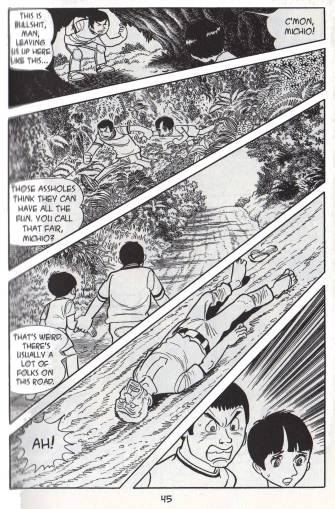 SPURGEON: Can you give an example or two of something in
SPURGEON: Can you give an example or two of something in MW
that benefited from Tezuka's strengths as an illustrator? There's an element of thinking about manga that almost treats the art as code, communicating quickly and effectively, that I wonder where this kind of bravura imagery fits in and how it changes the way we read a story.
WELSH: There's a really amazing sequence where we first see what happened on the island (pages 45 to 49). First, Yuki and Garai are running downhill, and the angle of the panels is skewed to show the descent. It levels off as they cross the horizon into the village, and it gets random as they discover the extent of the disaster. That continues, and Tezuka mixes in some different styles in a few key panels that are speculative, not a memory. And then there's a final full-page shot of the village. It's panel composition as a builder of mood, this kind of visual language of shapes that indicates urgency, then instability, then scale, and it's a sequence that I think of as characteristic of Tezuka. There are a number of action or suspenseful sequences that have that kind of energy and way of leading the eye that are really effective for me. It's like what those motion comics try to do, but it's Tezuka guiding your eye instead of computer animation.
SPURGEON: Am I being a total Gomer if the first thing that popped into my mind when I saw that island with all the bodies wasn't an environmental disaster but shades of Hiroshima/Nagasaki? I think we can both agree that the message portion of MW
is evocatively communicated, but is it serious? Is it sophisticated? Did it connect to real environmental issues at the time of its publication?
WELSH: You're the least Gomer-y person of my cyber acquaintance, and I think that comparison is apt. I don't know if it connected to environmental issues so much as Japan's increasingly ambivalent response to the presence and influence of the United States on their politics and governance. The protest movements of the 1960s and 1970s were partly a response to the security treaty between Japan and the United States and the access it granted to the U.S. military. To have a chemical weapon unleashed on innocent civilians seems like one of the plausible nightmare results of that kind of access -- the notion of storing weapons, stationing soldiers, Japanese people of authority ultimately submitting to that kind of military presence. That's my interpretation of the political underpinnings of the work, that if you surrender your authority or sublimate your priorities to another nation, this could be the consequence. And I do think it's serious. Tezuka lived through World War II and the subsequent occupation, and he saw Japan grow in strength, so he had to be ambivalent, especially as a pacifist.
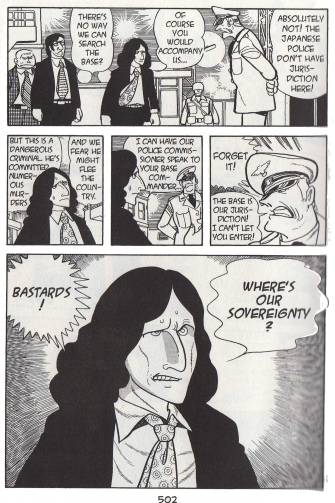 SPURGEON:
SPURGEON: MW
was one of Vertical's effort bring a different kind of Tezuka book to American audiences. How important do you think has that effort been generally? Is there a reason it hasn't been more successful, do you think?
WELSH: I think it's very important. Any time you can see the different facets of an artist of Tezuka's stature, it's worthwhile. And there are some great comics in the portion of Tezuka's catalog that were conceived for adults. I kind of hate to be one of those people who dismiss commercial outcomes in favor of cultural value, especially in this economy, but I do think the latter trumps the former, particularly in Tezuka's case. I would obviously respect any publisher that says, "We agree, but we just can't afford it."
Regarding its lack of commercial success, I think it's partly because we're dealing with niches of niches in terms of audience. Most of the manga audience is looking for entertainment, and it's great that there's so much of that available for them. But I don't know how many of them look at manga as something with a historical context or care about it. So that leaves the portion of the manga audience that's curious about the whole medium, the range of stories that can be told, and the timeline of how it's evolved, plus the comics omnivores who just like good comics no matter what their provenance may be. Much as I wish it were otherwise, that's just not a huge group of consumers, no matter where the comics are coming from or when. That said, I think Vertical has enjoyed some real successes. Tezuka's
Buddha made it through both hardcover and paperback runs, and
MW was just offered again by Diamond.
SPURGEON: Are you able to speak to the book's influence? I don't really know what effect it had for Tezuka to be doing work like this at the moment he did. Is there anything to be said for MW
as a publishing project? Do you think we'll see more select reprintings of older manga, like the kind that D&Q has been doing, or has that window closed for now?
WELSH: I can't help but think that Tezuka doing
gekiga had to legitimize the whole category to an extent. The movement started in part as a response to the kind of comics Tezuka did so much to popularize, the kid-friendly adventure stories -- even though not all of them seem so kid-friendly in retrospect. As far as having an influence on his subsequent output, it seems more like
gekiga was something that he added to his repertoire rather than taking primacy. He still did adventure stories for kids and historical dramas and biographies, but he did this kind of adult story as well.
I do see
MW's influence in
Naoki Urasawa's Monster, which has that moment of fateful binding between two people and a subsequent game of cat and mouse between them.
Monster has less pointed social commentary, but it does have some similar underpinnings. But there's a lot of Tezuka influence in Urasawa's work, obviously.
My arguments for
MW as a publishing project might be kind of simplistic, but I stand by them. First, I think that having more of Tezuka's work available in English has value because he's a giant. Second, I think that, even when his comics feel very much of their time, there's some exciting aspect of the storytelling or some wild flight of fancy that makes them seem fresh. There's always something exciting about his work.
And I do think we'll see more from the classics category, though I think the pace will probably slow. Vertical has expressed a commitment to Tezuka's
Black Jack. Their upcoming manga titles are contemporary, which is new for them, but Ed Chavez has said that they're looking at more Tezuka, and they're open to the possibility of publishing some classic shôjo work. Drawn & Quarterly
will publish one of Yoshihiro Tatsumi's long-form gekiga works next year, and
CMX and
DMP are releasing some relatively vintage shôjo titles. I don't think classics will ever dominate the market, but I do think they'll continue to have a presence. The window is more ajar than it is wide open, but I don't think it's closed.
*****
*
MW, Osamu Tezuka, Vertical, softcover, 584 pages, 9781932234831, 2007, $24.95.
*****
This year's CR Holiday Interview Series features some of the best writers about comics talking about emblematic -- by which we mean favorite, representative or just plain great -- books from the ten-year period 2000-2009. The writer provides a short list of books, comics or series they believe qualify; I pick one from their list that sounds interesting to me and we talk about it. It's been a long, rough and fascinating decade. Our hope is that this series will entertain from interview to interview but also remind all of us what a remarkable time it has been and continues to be for comics as an art form. We wish you the happiest of holidays no matter how you worship or choose not to. Thank you so much for reading
The Comics Reporter.
*
CR Holiday Interview One: Sean T. Collins On Blankets
*
CR Holiday Interview Two: Frank Santoro On Multiforce
*
CR Holiday Interview Three: Bart Beaty On Persepolis
*
CR Holiday Interview Four: Kristy Valenti On So Many Splendid Sundays
*
CR Holiday Interview Five: Shaenon Garrity On Achewood
*
CR Holiday Interview Six: Christopher Allen On Powers
*****
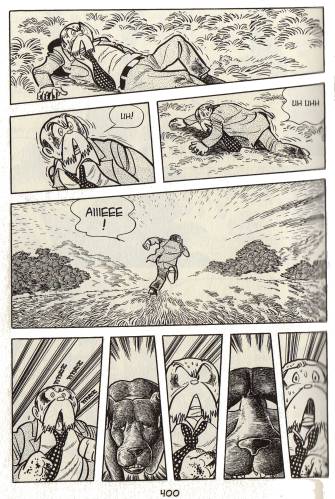
*****
*****
posted 2:00 am PST |
Permalink
Daily Blog Archives
November 2019
October 2019
September 2019
August 2019
July 2019
Full Archives


